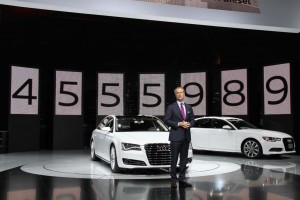Despite falling sales at its flagship VW brand, the Volkswagen Group of America has defied naysayers who have long argued that U.S. motorists won’t buy diesels – moving more than 100,000 Volkswagen Audi “oil burners” during 2013.
It marks the first time the Volkswagen Group has reached this milestone in a calendar year, according to Mark McNabb, Volkswagen of America’s new chief operating officer. Volkswagen and Audi currently offer 12 different TDI Clean Diesel powered models in the United States, including three new models launched by the upscale brand for 2014.
“Selling more than 100,000 TDI Clean Diesel vehicles is a significant milestone for Volkswagen Group of America,” McNabb said. “We’re excited to see the increasing numbers of customers able to enjoy the reliability, durability, fuel-efficiency and power of the clean diesel engine.”
Following the collapse of diesel’s popularity in the 1980s due to a variety of problems, manufacturers have largely steered clear of the technology, but German makers have embraced the technology as an alternative to hybrid power as they seek to meet increasingly stringent U.S. fuel economy standards. The VW brands have been particularly aggressive, Audi adding diesel versions of its Q5, A7 and A8 for 2014.
“The past year has shown that American consumers clearly recognize the benefits of clean diesel TDI vehicles,” said Scott Keogh, President, Audi of America. “They understand now more than ever that this is a technology delivering real answers to society’s concerns about fuel consumption and greenhouse gas emissions without compromises,” Keogh added.
(Click Here to check out the hottest new high-mileage technologies of the year.)
The TDI Clean Diesel Volkswagen models accounted for 21% of the maker’s sales in November and 24% of sales year-to-date, a record for the brand.
The TDI models in the Audi and Volkswagen lineup deliver up to 30% better fuel economy and 12%-30% lower carbon dioxide emissions than gasoline engines. As a recent series of Audi commercials attempted to explain, there is no need for driver behavior change except to move from one pump to the other.
However, the record diesel sales have not guaranteed commercial success in the U.S. for Volkswagen Group. While Audi is expected to set a sales record this year, sales for the Volkswagen brand have dropped by 8%, leading to a loss of market share.
The consternation created by Volkswagen’s drop in sales was underscored earlier this month when VW announced the retirement of former VOA chief executive officer Jonathan Browning, with McNabb tapped to become COO. An announcement about a second vehicle at for the under-utilized Volkswagen assembly plant in Chattanooga Tennessee is due in the coming weeks, and the maker is expected to add a production version of its CrossBlue crossover concept.
(Despite declining prices, fuel economy continues to rise. Click Here for more.)
Before his retirement, Browning told reporters the introduction of the utility vehicle was critical to bolstering the VW brand by targeting the fast-growing midsize utility segment which now accounts for 10% of all vehicles sold in the U.S. The new diesel is also thought likely to offer a diesel option.
The Volkswagen Group of America is the current U.S. market leader in the sale of clean diesel vehicles. Volkswagen, for example, offers the technology in seven different models — the Beetle, Beetle Convertible, Golf, Jetta, Jetta SportWagen, Passat and Touareg — six of which get an EPA estimated fuel economy rating of 40 mpg or more on the highway.
(Paul A. Eisenstein contributed to this report.)


Diesels seem destined to increase as a percentage of vehicle engine production. A large and basic question I’ve long wondered about is what’s going to happen to gasoline? A 42-gallon barrel of oil will tpically distill out to 19 constituent gallons of gasoline, but only 10 gallons of diesel (the remainder being pricipally comprised of jet fuel and other kerosenes, liquified petroleum gas, various lubricants and fertilizer stock). Should diesel engines gain sales dominance, either diesel fuel prices will soar or oil companies will suffer profit shortfalls. Among things more likely to happen than that is a Super Bowl title for the Detroit Lions.
Remember, Fantab, a fair bit of American refinery production already is exported — one reason blamed for high diesel prices now. So, if demand shifts, that could be handled by shifting export volumes.
Paul A. Eisenstein
Publisher, TheDetroitBureau.com
American refineries export a lot of their production, sure, but plenty of that is diesel shipped to Europe (and elsewhere) because there’s not enough domestic demand. The point is that the arithmetic is inescapable: quantity X of crude oil will always be transformed to almost twice as much gasoline as diesel.
I’ve been driving MB diesels for years, so no one was surprised when my new VW was a diesel (might have waited for MB’s new 4-cyl. if I’d known how good it would be). But my brother-in-law’s new Audi A8L being a diesel was. Its a case of ‘test drive; OH WOW; sign here’. I predict the appreciation will spread.
Volkswagen limited how many Diesels it brought to the U.S. in years gone by to try and move the more profitable gas engine models. They do have a much better Diesel model line up now and they are excellent vehicles per se.
As far as Diesel fuel per barrel, the refineries have inflated Diesel prices so outrageously that it’s almost a wash to buy a Diesel for many people depending on what type of driving you do. It’s absolutely obscene for Diesel to cost more at the pump when it costs less to produce. If there was a true shortage of crude then maybe one could argue a small price increase for Diesel but there is no shortage of crude. It’s all just price gouging from the oil industry Cabal who has an unregulated monopoly.